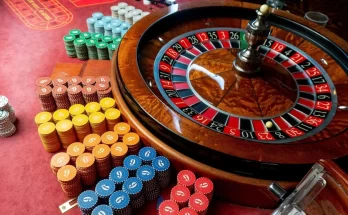Gambling can be an addictive behavior. When gambling triggers the reward system in the brain to release dopamine, causing a high that is highly seductive for gamblers. They quickly become preoccupied with gambling rather than living their daily lives to its full potential.
Gambling can have devastating repercussions for both the gambler and his or her loved ones, on an individual, interpersonal and societal level.
Problems
Gambling problems can result in numerous issues, from financial difficulties and straining relationships to diminishing mental health. People struggling with gambling may benefit from therapy techniques like behavior therapy and cognitive behavioral therapy (CBT) in order to address their disorder and address its symptoms.
Some individuals develop gambling issues as a result of an underlying mood disorder such as depression or anxiety, leading to more impulsivity and the possibility of gambling addiction. Furthermore, those suffering from mood disorders may be less likely to seek professional help for their gambling habit, leading to further complications in life.
Gambling problems may include lying to family and others about it, stealing money from family and others, jeopardizing job or educational opportunities and spending too much time gambling than expected. Problem gamblers may neglect other areas of life such as eating, sleeping and personal hygiene in favor of gambling; stress-related symptoms including digestive symptoms and increased cortisol levels that impact physical health may also arise as a result.
Addictions
As is often the case with substance use disorders, those suffering from gambling disorders experience compulsive urges to gamble despite its negative consequences. Gambling disorder has devastating repercussions for sufferers including financial strain, loss of employment and family tension. Addicts frequently lie about their spending habits in an effort to conceal them from loved ones while experiencing depression and anxiety leading to suicidal thoughts.
Mentally healthy people are at higher risk for gambling disorders than others. Furthermore, as age increases so does risk. People living on low incomes are particularly prone to gambling disorder because they have more to lose.
Assisting someone struggling with gambling disorder requires setting boundaries and ceasing to enable behavior – such as covering expenses for them or lending money. Furthermore, finding healthy ways of combatting stress such as exercising regularly, eating healthily and socializing are crucial steps towards providing relief.
Social isolation
Gambling has negative social repercussions that affect individuals, families, and communities. These effects can be divided into financial, labor, health and well-being impacts – with financial repercussions including gambling revenues impacting other sectors of the economy; changes in job performance or losses costing the workforce; health effects including personal relationships being altered due to gambling as well as emotional distress or any other negative outcomes related to it.
Studies have demonstrated the correlation between loneliness and problem gambling as well as COVID-19 worry and increased gambling risks among older adults, making loneliness the leading indicator. Exploring these vulnerabilities among this population should also be prioritized, as previous research indicates it may not always provide protection from gambling problems; indeed some gamblers report high levels of loneliness despite having numerous social relationships.
Financial issues
Gambling problems can create serious financial woes for individuals. People may incur massive debt or lose their homes as a result of reckless gambling behavior. They might also start hiding or lying about where their money goes – behaviors which put strain on relationships and create stress within families.
Gambling can lead to feelings of guilt and low self-esteem, leading to depression and the desire to escape reality by gambling again. Furthermore, gambling often distracts people from fulfilling other responsibilities they must fulfill, leading them to miss workdays or perform poorly at school or work.
Individuals suffering from gambling disorders tend to isolate themselves, leading to feelings of loneliness. Missed work and financial issues may also result in job loss; theft often helps finance gambling habits while payday loans or other forms of debt accumulate as a result of gambling addiction. To break their addiction, individuals can try limiting access to cash and stop visiting clubs, pubs, TABs and casinos for betting or by seeking help from financial counsellors.




